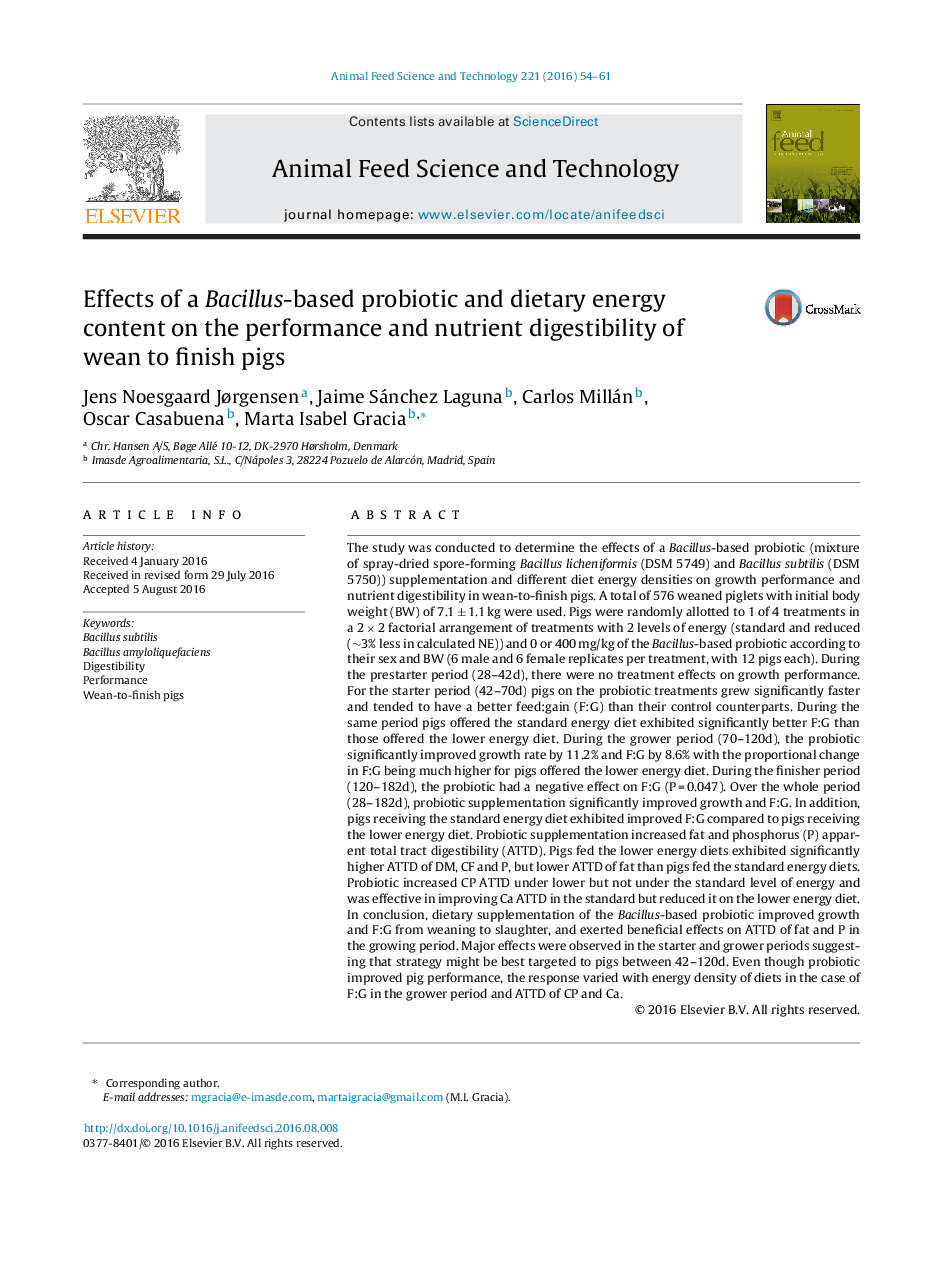| کد مقاله | کد نشریه | سال انتشار | مقاله انگلیسی | نسخه تمام متن |
|---|---|---|---|---|
| 2419223 | 1402405 | 2016 | 8 صفحه PDF | دانلود رایگان |
• Bacillus-based probiotic in two energy density diets on performance & digestibility.
• The Bacillus-based probiotic improved growth and F:G from weaning to slaughter.
• Greatest responses obtained in starter-grower periods and in the lower energy diet.
• Apparent total tract digestibility of fat and P was improved with probiotic.
• Apparent digestibility of CP was also improved but only in the lower energy diet.
The study was conducted to determine the effects of a Bacillus-based probiotic (mixture of spray-dried spore-forming Bacillus licheniformis (DSM 5749) and Bacillus subtilis (DSM 5750)) supplementation and different diet energy densities on growth performance and nutrient digestibility in wean-to-finish pigs. A total of 576 weaned piglets with initial body weight (BW) of 7.1 ± 1.1 kg were used. Pigs were randomly allotted to 1 of 4 treatments in a 2 × 2 factorial arrangement of treatments with 2 levels of energy (standard and reduced (∼3% less in calculated NE)) and 0 or 400 mg/kg of the Bacillus-based probiotic according to their sex and BW (6 male and 6 female replicates per treatment, with 12 pigs each). During the prestarter period (28–42d), there were no treatment effects on growth performance. For the starter period (42–70d) pigs on the probiotic treatments grew significantly faster and tended to have a better feed:gain (F:G) than their control counterparts. During the same period pigs offered the standard energy diet exhibited significantly better F:G than those offered the lower energy diet. During the grower period (70–120d), the probiotic significantly improved growth rate by 11.2% and F:G by 8.6% with the proportional change in F:G being much higher for pigs offered the lower energy diet. During the finisher period (120–182d), the probiotic had a negative effect on F:G (P = 0.047). Over the whole period (28–182d), probiotic supplementation significantly improved growth and F:G. In addition, pigs receiving the standard energy diet exhibited improved F:G compared to pigs receiving the lower energy diet. Probiotic supplementation increased fat and phosphorus (P) apparent total tract digestibility (ATTD). Pigs fed the lower energy diets exhibited significantly higher ATTD of DM, CF and P, but lower ATTD of fat than pigs fed the standard energy diets. Probiotic increased CP ATTD under lower but not under the standard level of energy and was effective in improving Ca ATTD in the standard but reduced it on the lower energy diet. In conclusion, dietary supplementation of the Bacillus-based probiotic improved growth and F:G from weaning to slaughter, and exerted beneficial effects on ATTD of fat and P in the growing period. Major effects were observed in the starter and grower periods suggesting that strategy might be best targeted to pigs between 42–120d. Even though probiotic improved pig performance, the response varied with energy density of diets in the case of F:G in the grower period and ATTD of CP and Ca.
Journal: Animal Feed Science and Technology - Volume 221, Part A, November 2016, Pages 54–61
